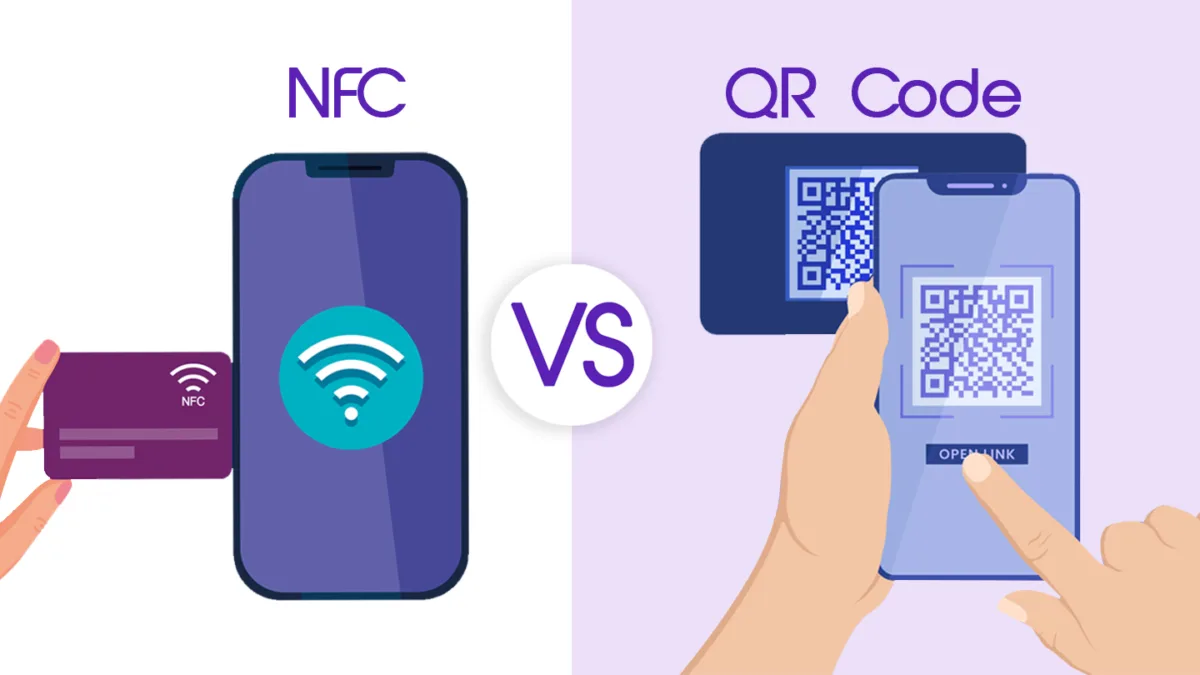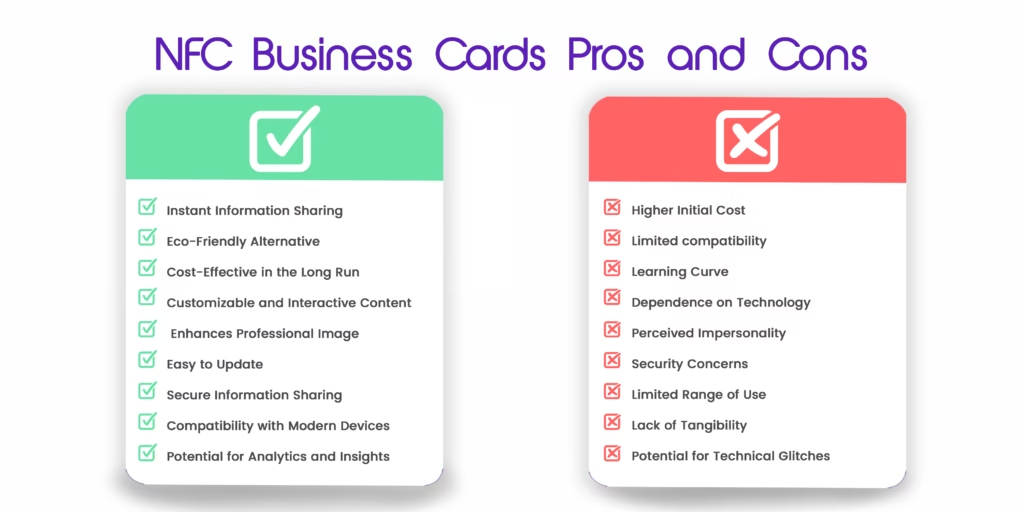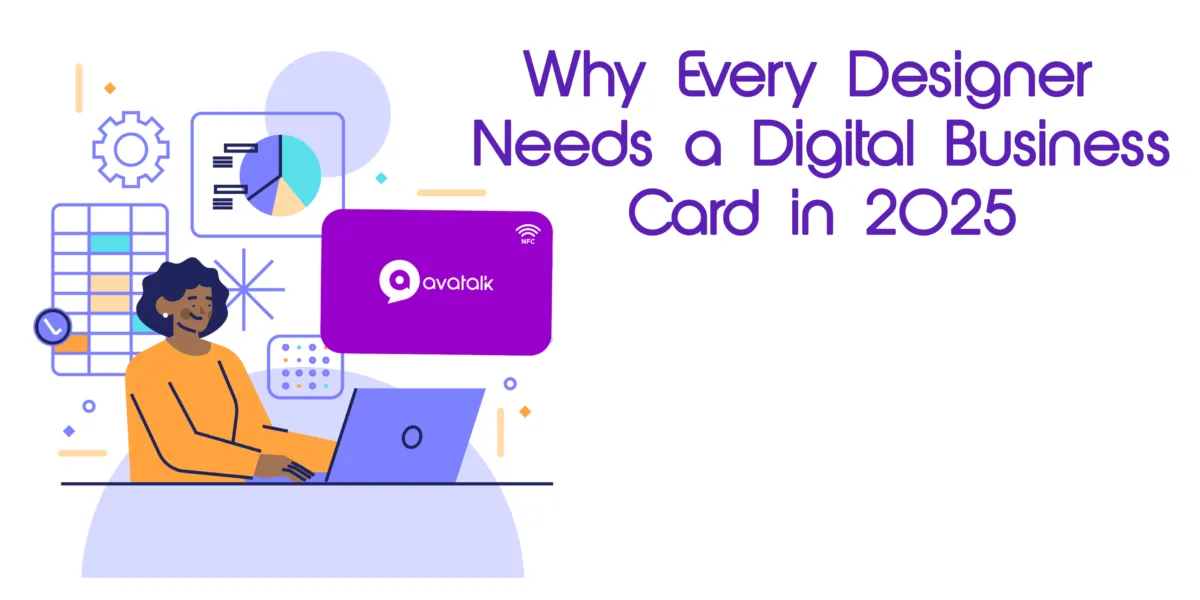
NFC vs QR Code Business Cards: Which One Should You Choose?
Explore NFC vs. QR Code business cards, their benefits, and which suits your networking needs best.
In today’s fast-paced digital world, the way we network is evolving rapidly. Traditional paper business cards, once a staple in professional circles, are now facing competition from their tech-savvy counterparts—NFC business cards. But what exactly are NFC business cards, and should you make the switch?
Business cards featuring NFC (Near Field Communication) technology enable wireless communication between devices that are near together, typically within a few centimeters. When tapped against a compatible smartphone or device, the chip triggers an action, such as opening a website, displaying contact information, or even launching a specific app.
NFC technology operates on the same principles as RFID (Radio Frequency Identification) but with a much shorter range. The NFC chip in the card is passive, meaning it doesn’t have its own power source. Instead, it draws power from the electromagnetic field of the device it’s interacting with. This brief interaction is enough to transmit the stored data, such as your contact details or a link to your portfolio.
NFC business cards offer a host of advantages that make them a compelling choice for modern networking.
One of the most significant advantages of NFC business cards is the ability to share information instantly. With just a tap, your contact can save all your details directly to their phone, eliminating the need to manually input the information. This convenience is a huge time-saver and reduces the risk of errors in data entry.
Traditional business cards contribute to paper waste, especially if you frequently attend networking events. NFC business cards, on the other hand, are a more sustainable option. Since they’re reusable, you only need one card instead of printing hundreds of paper cards. They are an eco-friendly option for professionals who care about the environment.
Although the initial cost of an NFC business card may be higher than that of traditional paper cards, they can be more cost-effective over time. Since you only need one or a few cards, you save on printing costs, and you won’t have to reprint new cards when your information changes. You can simply update the details linked to the NFC chip.
With NFC business cards, you’re not limited to just text. You can link your card to a variety of digital content—your LinkedIn profile, a portfolio, a promotional video, or even an AR experience. You may stand out from the crowd and leave a lasting impression with this level of personalization.
Using NFC business cards can enhance your professional image. They demonstrate that you are tech-savvy and up-to-date with the latest trends. This can be particularly helpful in fields where technology and innovation are highly prized.
One of the frustrations with traditional business cards is that they become outdated quickly—new phone numbers, email addresses, or job titles mean you have to get a whole new set of cards. With NFC business cards, you can update the information linked to the card instantly. No reprinting necessary.
NFC business cards offer a more secure way to share your information. Unlike QR codes, which can be scanned from a distance, NFC requires close proximity. By doing this, the possibility of someone accessing your data without your permission.
Most smartphones are equipped with NFC technology, making it easy for others to access your information. As more devices become NFC-enabled, the adoption of NFC business cards is likely to grow, ensuring that you stay ahead of the curve.
Some NFC business card platforms offer analytics, allowing you to see who has interacted with your card and when. This might give you insightful information about your networking activities and improve the way you follow up.
Despite their many advantages, NFC business cards also come with certain drawbacks that need to be considered.
While NFC business cards can be cost-effective in the long run, the initial cost is significantly higher than traditional paper cards. For individuals on a restricted budget or small organizations, this could be a hurdle.
Although most modern smartphones are NFC-enabled, not all devices have this capability. This means that some of your contacts may not be able to access the information on your NFC card. It’s essential to have a backup option, like a QR code, for those who can’t use NFC.
For those unfamiliar with NFC technology, there may be a learning curve. Not everyone knows how to use NFC, and some people may be hesitant to tap their phone against a card, fearing data breaches or malware. Educating your contacts on how NFC works is sometimes necessary.
NFC business cards rely on technology, which means they’re only as good as the device they’re interacting with. If a smartphone’s NFC function is disabled or malfunctioning, the card won’t work. Additionally, NFC cards are not immune to technical issues, such as malfunctioning chips.
While NFC business cards are undoubtedly cool, they can come across as impersonal. There’s something about handing over a physical card that adds a personal touch to the interaction—something that digital alternatives might lack.
Even though NFC is generally secure, there are still some security concerns. For instance, NFC tags can be overwritten or tampered with if not properly secured. This could potentially lead to data breaches or the dissemination of incorrect information.
NFC business cards are still relatively new and not universally accepted. Some industries or professionals may prefer traditional business cards, seeing them as more reliable or familiar. Therefore, NFC business cards might not be suitable for all networking situations.
Traditional business cards have a physical presence—they can be kept in a wallet, displayed on a desk, or pinned to a board. NFC business cards, on the other hand, are intangible once the data is transferred. Some people might miss having something physical to hold onto.
As with any technology, there’s always the risk of technical glitches. NFC chips can fail, and smartphones may not always read them correctly. These technical issues can be frustrating, especially in a high-stakes networking scenario.

While NFC business cards offer many advantages, they may not be suitable for every situation. They’re ideal for tech-savvy professionals, digital marketers, or anyone working in an industry that values innovation. However, for more traditional industries or events where not everyone has NFC-enabled devices, it might be wise to carry a few paper business cards as a backup.
As technology develops, we can expect NFC business cards to become more prevalent. They represent a shift towards digital networking and offer a glimpse into the future of how professionals will exchange information. However, like any technology, they have their limitations, and it will be interesting to see how they evolve to address these challenges.
Not all smartphones are NFC-enabled. While most modern devices support NFC, some older models or budget phones may not. It's always a good idea to have a backup option, such as a QR code.
Updating the information on your NFC business card is simple. Most NFC business card providers offer an online platform where you can edit your details. The changes will be reflected immediately the next time someone taps your card.
NFC technology is generally secure, but like any technology, it's not without risks. Ensure that your NFC chip is adequately secured to prevent tampering, and educate your contacts on how to use NFC safely.
If you lose your NFC business card, your information won't be compromised, as the NFC chip doesn't store data directly. However, you'll need to replace the card to continue using it.
While NFC business cards are versatile, they may not be suitable for every industry. In more traditional fields, paper business cards may still be preferred. However, in tech-savvy or innovative industries, NFC business cards can help you stand out.
NFC business cards are an exciting development in the world of professional networking. They offer numerous benefits, from instant information sharing and eco-friendliness to enhanced customization and professional image. However, they also come with some drawbacks, such as higher costs, limited compatibility, and a potential lack of personal touch.
If you’re looking to impress with cutting-edge technology and make your networking efforts more efficient, NFC business cards could be a great fit. On the other hand, if you value the traditional exchange of physical cards or work in an industry that’s slow to adopt new technology, you might want to stick with paper cards for now.

Explore NFC vs. QR Code business cards, their benefits, and which suits your networking needs best.

Discover how HiredAI transforms job hunting and recruiting through powerful AI matching, automation, and a sleek mobile app for Android and iOS.

Discover why every designer needs a digital business card in 2025. Enhance networking, showcase your work, and stay ahead of the game!

Enhance your networking experience with Avatalk's innovative AI-driven digital business card. This tool facilitates more meaningful connections with clients and allows you to elevate your professional presence seamlessly. Cultivate lasting relationships with ease and efficiency.
Useful Links
Follow Us
INNOVATIWAY LIMITED © 2025. All rights reserved.
All fields are required.
